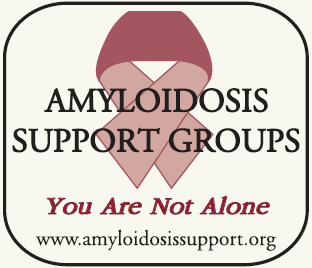DISCLAIMER
The information and materials accessed through or made available for use on any of our Sites, including, any information about diseases, conditions, treatments, or medicines, are for informational purposes only. The Content is not intended to be and is not a substitute for professional medical advice, diagnosis, or treatment, and your participation on our Sites does not create a healthcare professional-patient relationship. You should consult a doctor or other qualified health care professional regarding any questions you have about your health or before making any decisions related to your health or wellness. Call your doctor or 911 immediately if you think you may have a medical emergency.message sent
email sent successfully
| rareLife solutions 606 Post Road East #397 Westport, CT 06880 |
||
| You are receiving this because you have an account on www.oneAMYLOIDOSISvoice.com | ||
| To unsubscribe from these emails, click here | ||
Trusted Resources: Community Center
Online support, community stories, financial assistance
Managing hATTR Amyloidosis
In an interview with Rare Disease Report, Mathew Maurer, MD, Arnold and Arlene Professor of Cardiology at Columbia University, explained the standard of care and current management tactics for individuals with hATTR Amyloidosis.
Maurer: The standard treatment, or I should say management for this condition, is very different than what we hope treatment will be. Currently we manage the condition and the manifestations by treating the symptoms of, if you will, heart failure. We encourage patients to stay physically active, avoid smoking, adhere to a relatively low sodium diet, assuming they have a clinical syndrome and heart failure which means they’re swollen and full of water, and we also encourage self-management skills. For instance, weigh yourself on a daily basis because when you have some dietary indiscretion, eat a little extra salt, you can gain a lot of fluid pretty quickly and that can really exacerbate your baseline symptom. Those are kind of management strategies — none of them are treating the underlying condition.
 myBinder
myBinderRelated Content
-
news & meetingsMajor Advances are Afoot in Management of ATTR Cardiac AmyloidosisCardiac amyloidosis, traditionally consi...
-
videos & visualsLiana (Brazil) – Living With hATTR Amyloidosishttps://www.youtube.com/watch?v=t-tyIYoK...
-
educationTransthyretin Amyloidosis: Information for Patients and FamilyWhat is transthyretin amyloidosis? Tran...
-
educationHereditary ATTR Amyloidosis: Burden of Illness and Diagnostic ChallengesHereditary transthyretin-mediated (hATTR...
-
people & placesNaresh Bumma, MDNaresh Bumma is an Assistant Professor i...
-
videos & visualsQ&A Discussion on Attralus Trials and Diflunisal Use – ASG Webinar 7.15.23 – 7/7https://www.youtube.com/watch?v=UcxmPgZ7...
-
educationTwo Novel APOA1 Gene Mutations in a Japanese Renal Transplant Recipient With Recurrent Apolipoprotein A-I Related Am...Apolipoprotein A-I amyloidosis is a rare...
send a message
To improve your experience on this site, we use cookies. This includes cookies essential for the basic functioning of our website, cookies for analytics purposes, and cookies enabling us to personalize site content. By clicking on 'Accept' or any content on this site, you agree that cookies can be placed. You may adjust your browser's cookie settings to suit your preferences.
More information
The cookie settings on this website are set to "allow cookies" to give you the best browsing experience possible. If you continue to use this website without changing your cookie settings or you click "Accept" below then you are consenting to this.








